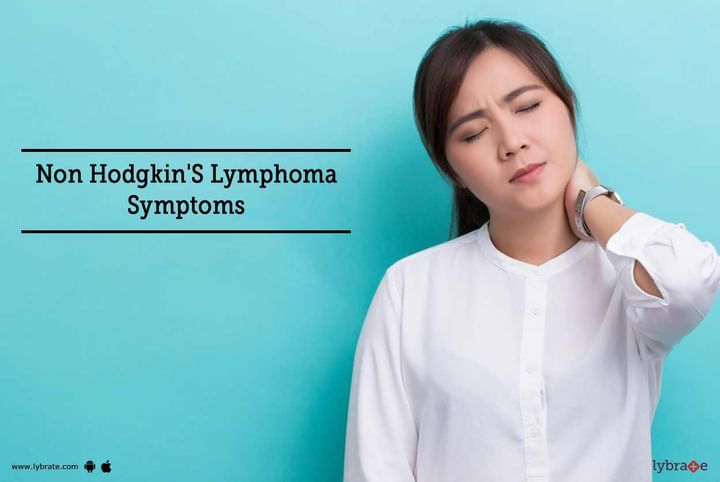Non Hodgkin's Lymphoma Symptoms: First Signs When You Might Be Having Non Hodgkin's Lymphoma
Last Updated: Jul 17, 2020
If a person finds himself/herself sweating while sleeping at night then it should not be considered as night sweats. This situation is completely normal and does not indicate any medical condition. However, if a person wakes up suddenly at night, completely drenched in sweat then it is referred to as night sweats.
Sometimes, night sweats are so severe that a person has to change his/her bedsheets and clothes. In some rare cases, night sweats can occur at day time as well. Although night sweats are associated with various other disorders, they are a vital symptom in diagnosing Non-Hodgkin's lymphoma. If a person is experiencing night sweats then he/she must consult the doctor immediately. Other symptoms of Non-Hodgkin's lymphoma include:
Persistent fatigue, lethargy, weakness
Persistent fatigue, weakness and lethargy are one of the common symptoms of Non-Hodgkin's lymphoma. When the lymphoma grows, it uses most of the nutrients of the body. Thus, the body is hardly left with any nutrient for itself. This can make a person feel weak and lethargic. Thus, if a person is feeling tired without any specific reason then he/she must consult the doctor to find the exact cause.
Loss of appetite, nausea, vomiting
As the lymphomas start growing and spreading within the body, a majority of the people experience loss of appetite along with nausea and vomiting. The growth of the lymphoma in the abdominal region is responsible for a person feeling full along with vomiting and nausea. If a person is experiencing any such symptoms then he/she must consult the doctor immediately for diagnosing the probable cause.
Rapid or unexplained weight loss
Weight loss can occur in a person rapidly who suffers from this condition. This rapid weight loss is due to the growth of the lymphomas in the body. For a person suffering from lymphoma, it is normal to lose 10 to 15 pounds in a month. Also, loss of appetite is one of the major reasons for the rapid reduction in weight.
Abdominal pain or swelling, or a feeling of fullness
The growth of the lymphoma in the abdomen or belly can lead to pain or swelling in the abdomen region. This symptom could also occur because of the enlargement of the organs such as the liver and spleen or because of the accumulation of large quantity of fluid in the abdomen.
When an enlarged spleen pushes against the stomach, it leads to feeling full even after eating a small meal. If a person experiences any such symptom then there are chances that he/she might be suffering from Non-Hodgkin's lymphoma.
Skin rash or itchy skin
A person experiencing itchy skin or a skin rash is not common in people suffering from Non-Hodgkin's lymphoma. However, there are still a few people who might experience this symptom. If a person has itchy red or purple lumps under the skin then he/she must visit the doctor immediately.
Coughing or shortness of breath
Another symptom of Non-Hodgkin's lymphoma can be shortness of breath or coughing. This symptom appears when the lymphoma grows within the chest and the neck region. The shortness of breath can occur due to lymphoma growing in the mediastinum.
It is a region of the chest that is responsible for housing the anatomical structures like the heart and the border of the lungs. If a person experiences shortness of breath then he/she must consult the doctor immediately for diagnosing the problem.
Headaches
Headache is one of the most common symptoms of Non-Hodgkin's lymphoma. This symptom appears when there is a growth of lymphoma in the brain. This growth of the lymphoma is responsible for causing a headache in a person. If a person is suffering from persistent headaches then he/she must consult the doctor immediately to check for Non-Hodgkin's lymphoma.
Difficulty moving parts of the body
If the lymphoma spreads to the brain then it makes it difficult for a person to move his/her body parts. The lymphoma of the brain is termed as primary brain lymphomas. If a person is experiencing difficulty in moving his/her body parts then a doctor must be consulted on an emergency basis to diagnose the cause of the appearance of the symptom.
References
- Evans LS, Hancock BW. Non-hodgkin lymphoma. The Lancet. 2003 Jul 12;362(9378):139-46. [Cited 06 April 2020]. Available from:
- Mawardi H, Cutler C, Treister N. Medical management update: Non-Hodgkin lymphoma. Oral Surgery, Oral Medicine, Oral Pathology, Oral Radiology, and Endodontology. 2009 Jan 1;107(1):e19-33. [Cited 06 April 2020]. Available from:
- Söderholm AL, Lindqvist C, Heikinheimo K, Forssell K, Happonen RP. Non-Hodgkin's lymphomas presenting through oral symptoms. International journal of oral and maxillofacial surgery. 1990 Jun 1;19(3):131-4. [Cited 06 April 2020]. Available from:
Table of content
Ask a free question
Get FREE multiple opinions from Doctors



